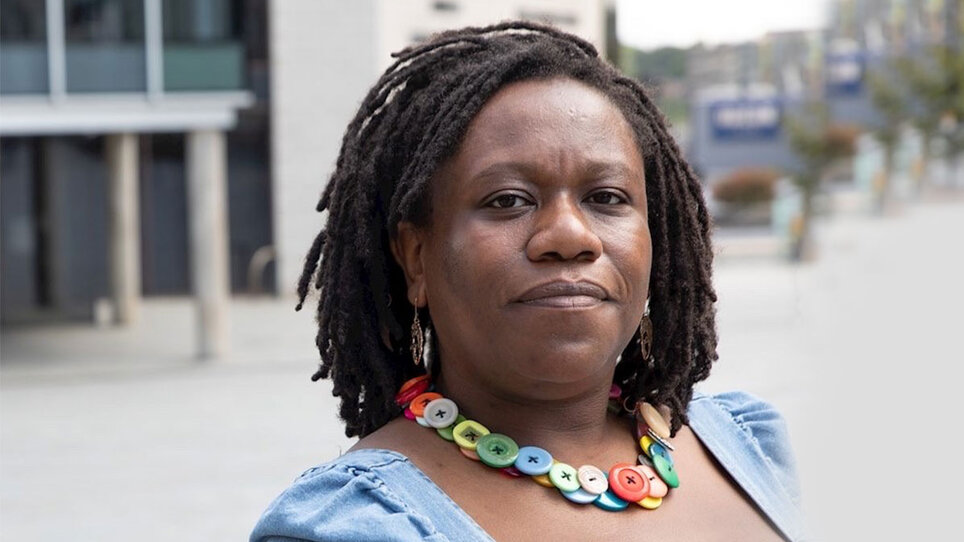
"We need Black history to be shared and discussed widely..."
Tylan Grant
- on why we should be discussing Black history all year round
Celebrating Black History Month with...Tylan Grant
October is Black History Month, which celebrates the enormous contribution Black Britons have made to society. This is an important time to highlight Black autistic people’s stories – and the double discrimination so many face trying to get the right support and services.
We caught up with Tylan Grant, autistic actor and an ambassador for our charity. Tylan chatted to us about why Black History Month shouldn’t be limited to a month, why there’s not enough representation of Black autistic people in the media, and the barriers they’ve faced in accessing support before and during coronavirus.
Can you talk to us about what Black History Month means to you and your family?
To me, Black History Month should not be limited to a month. Black people have been making an impact on every area of life and work for centuries, so it’s important that this history is unearthed and shared at all times.
I think all celebrating will probably be done online this year, given the current situation.
"Black History Month should not be limited to a month. Black people have been making an impact for centuries, so it’s important that this history is shared."
Many autistic people face discrimination getting support and a diagnosis, and we know people Black autistic people have even more difficulty getting a diagnosis and support. What was your experience?
Concerns about whether a child is autistic are very often first raised by their school. This is why teachers need to be educated in what to look for when it comes to autism. If the school has preconceived ideas about race and culture and tropes about that race and culture, I think it is more likely that the child’s challenges will be perceived as a social issue rather than one of neurodiversity. This is a big issue for our communities.
For a long time, my primary school didn’t believe my official diagnosis. It’s hard to get to the bottom of why this was. Was it because I was female? Was it because I was sociable? Was it because I was Black? I have no idea. So much more could have been put in place for me at primary school that would have helped me as I progressed into secondary school, if only there had been an acceptance of my autism.
Our Left Stranded report shows that 9 in 10 autistic people worried about their mental health during lockdown and 85% said their anxiety levels got worse. Is this something that you relate to?
I definitely experience anxiety in general, but actually lockdown was OK for me. I had time with my family and our home has a very accepting environment. It’s full of challenges but those challenges felt easier without the outside world being involved.
I also have a job where people really “get me” and this means returning to work has not been too bad. If this had happened when I was at school it would have totally floored me as I was in a low place for so long with very poor mental health. When I was at school I thought nothing would ever get better, but that’s not necessarily true. There can be good things ahead.
Would you be able to talk more about your experiences accessing support and whether you have seen a change in accessing support during coronavirus outbreak?
Our experience as a family has been both really good and really bad. I had to be in the worst of places as a young teen before CAMHS (Children and Adolescent Mental Health Services) even got involved. School didn’t give me the help I needed. I had an EHCP (Education Health and Care Plan) but even that made very little difference. Once I became an urgent case the support started to emerge. My family have struggled to get support during the lockdown period, but things are getting better.
Do you think there is enough representation of Black autistic people in the media?
1,000% NO – growing up I had no role models at all. Where were the autistic Black women who I could identify with? Where were the non-binary Black autistic people? I feel like I have had to find all this within myself and that’s just sad and wrong.
Has anything changed for you since the Black Lives Matter protests?
Yes, in small ways - but these small ways create a ripple effect. We still have a long way to go. We also need to see if the impact lasts. I really relate to a Malcom X quote, "If you stick a knife in my back nine inches and pull it out six inches, that's not progress. If you pull it all the way out, that's not progress. Progress is healing the wound that the blow made. They haven't pulled the knife out; they won't even admit that it's there."
Are there any Black autistic people who you admire? Please tell us about them.
To be honest I don’t know any in the public eye. This shows precisely why we need Black history to be shared and discussed widely, and that Black people who may be autistic need greater access to assessments and diagnosis.
"We need Black history to be shared and discussed widely, and Black people who may be autistic need greater access to assessments and diagnosis."

Find out more
- Read our information about the additional barriers many BAME autistic people and their families face getting the right support, including our research and details on what we’re doing to create a society that works for BAME autistic people.
- Visit our contact centre, which includes details about our helplines, for information, guidance and support.
- Sign our letter to the Government, calling for investment in autistic people’s futures.
Similar stories

"As a child I didn't know who I was as I didn't see people like me."
Tylan Grant
- on representations of autistic people in the media
Read more

"It is an honour to be born Black. Equally, it means that you will experience racism, prejudice and have to work twice as hard for half the acknowledgement."
Melissa Simmonds
- on why she is proud to be Black and autistic
Read more

"I sometimes feel that disability is treated as a secondary matter in society, and something needs to be done about this."
Judith Turkson-Baidoo
- on being a Black autistic woman and attitudes towards disability
Read more

The Spectrum magazine
Explore one of the UK's largest collections of autistic art, poetry, and prose. The Spectrum magazine is created by and for autistic people, and is available both online and in print.
Read the Spectrum





You are not alone
Join the community
Our online community is a place for autistic people and their families to meet like-minded people and share their experiences.
Join today